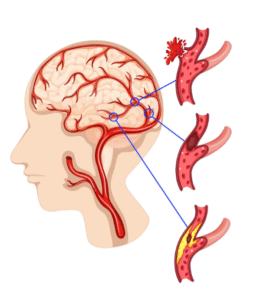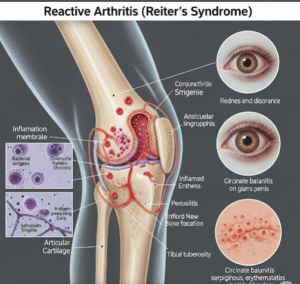Overview
Antiphospholipid Syndrome (APS) is an autoimmune disorder that increases the risk of blood clots in arteries and veins. It can lead to serious health problems such as stroke, heart attack, deep vein thrombosis (DVT), and complications in pregnancy. APS is also known as Hughes syndrome and often occurs in conjunction with other autoimmune diseases like lupus.
What is Antiphospholipid Syndrome?
Antiphospholipid Syndrome is a condition in which the immune system mistakenly produces antibodies—called antiphospholipid antibodies—that attack phospholipids, which are normal components of cell membranes. These antibodies increase the tendency of blood to clot, leading to a range of vascular and obstetric complications.
APS may be:
- Primary – when it occurs on its own.
- Secondary – when it is associated with other autoimmune diseases, especially systemic lupus erythematosus (SLE).
Symptoms
Symptoms vary depending on where clots form in the body. Common signs and complications include:
- Deep vein thrombosis (DVT): leg swelling, pain, and redness
- Pulmonary embolism: sudden shortness of breath, chest pain, coughing blood
- Stroke: sudden numbness, confusion, speech or vision problems
- Recurrent miscarriages or stillbirths
- Premature birth due to preeclampsia or placental insufficiency
- Low platelet count (thrombocytopenia)
- Livedo reticularis (a lacy purple rash on the skin)
- Headaches, migraines, or cognitive difficulties
Causes
The exact cause of APS is not fully understood, but it involves the immune system producing abnormal antibodies that increase blood clotting. Factors that may contribute include:
- Autoimmune disorders (especially lupus)
- Infections (e.g., syphilis, HIV, hepatitis C)
- Certain medications (e.g., hydralazine, quinine, phenytoin)
- Genetic predisposition
Risk Factors
- Having an autoimmune condition, especially lupus
- Family history of autoimmune or clotting disorders
- Prolonged immobility or surgery
- Use of birth control pills or hormone replacement therapy
- Smoking
- Pregnancy (increases risk of clot formation)
- Infections that trigger antibody production
Complications
- Stroke or transient ischemic attack (TIA)
- Heart attack or heart valve disease
- Pulmonary embolism
- Kidney damage from renal vein thrombosis
- Pregnancy complications (miscarriage, stillbirth, preeclampsia)
- Catastrophic APS (a rare, life-threatening form causing widespread clotting and organ failure)
Prevention
There is no guaranteed way to prevent APS, but risk can be reduced by:
- Avoiding smoking
- Maintaining a healthy weight
- Managing chronic conditions like lupus
- Avoiding estrogen-containing birth control
- Monitoring and adjusting medications with a doctor
- Regular screening if you have a history of clotting or miscarriages
Treatment Options in Korea
South Korea offers modern, multidisciplinary care for APS, involving rheumatology, hematology, obstetrics, and cardiology specialists.
1. Diagnosis
- Blood tests for antiphospholipid antibodies (anticardiolipin, lupus anticoagulant, and beta-2 glycoprotein I)
- Repeat testing after 12 weeks to confirm persistent positivity
- Additional tests for clotting, platelet counts, and autoimmune markers
2. Anticoagulation Therapy
- Warfarin is the main long-term treatment to prevent clots
- Heparin and low molecular weight heparin (LMWH) are used during pregnancy
- Aspirin may be used in low doses for mild cases or in pregnancy
3. Pregnancy Management
- High-risk pregnancies are closely monitored by maternal-fetal specialists
- Combination therapy with low-dose aspirin and heparin
- Regular ultrasounds and blood tests to assess fetal health
4. Immunosuppressive Medications
- In secondary APS (e.g., with lupus), hydroxychloroquine or corticosteroids may be used
- Rituximab or other biologics are considered in refractory cases
5. Supportive Care & Monitoring
- Regular INR monitoring for patients on warfarin
- Lifestyle modification guidance (diet, exercise, smoking cessation)
- Specialized clinics in Seoul and major cities for autoimmune disease management













